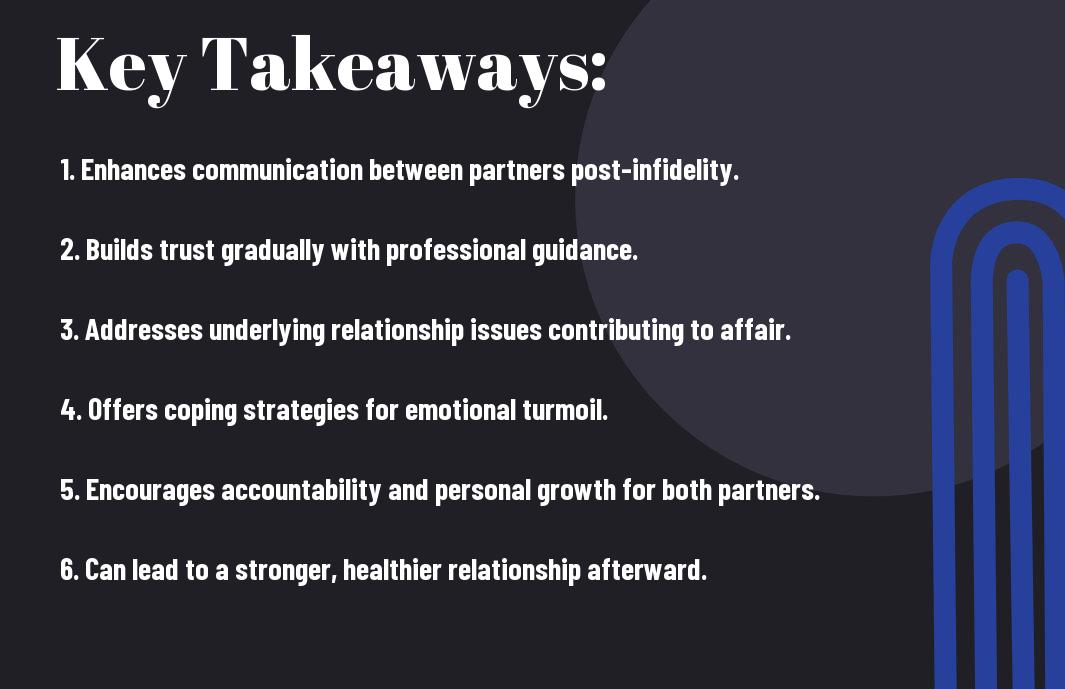Affair recovery therapy can be a significant step toward rebuilding your relationship after betrayal. If you find yourself grappling with the emotional fallout, understanding the benefits of this specialized therapy is important. You may wonder if the investment of time and money will be worth it. This therapy can help you navigate feelings of anger, confusion, and hurt, fostering healing and communication between you and your partner. By engaging in affair recovery therapy, you might discover a path to rebuild trust and strengthen your relationship in ways you never thought possible.

Key Takeaways:
- Affair recovery therapy can provide a structured environment for couples to address the aftermath of infidelity, fostering healing and rebuilding trust.
- Investing in therapy can lead to improved communication skills, helping partners express their feelings and needs more effectively.
- Therapists often utilize evidence-based techniques that help redefine relationship dynamics, promoting personal growth and shared understanding.
- The long-term benefits of therapy may outweigh the initial financial and emotional investment, leading to stronger, more resilient partnerships.
- Engaging in therapy encourages accountability and responsibility, helping both partners understand their roles in the relationship’s challenges.
- Therapy can provide a safe space for navigating feelings of guilt, anger, and betrayal, allowing for constructive dialogue and resolution.
- Success rates vary by couple, and the commitment to change from both partners plays a significant role in the effectiveness of therapy.

Understanding Affair Recovery Therapy
The journey of healing from an affair can be complex and challenging, but Affair Recovery Therapy offers a structured approach to guide couples through this difficult process. This specialized therapy aims to help partners rebuild trust, communicate effectively, and navigate the emotions that arise from infidelity. By seeking this therapeutic intervention, you take an important step towards understanding the underlying issues in your relationship.
Definition and Purpose
Definition: Affair Recovery Therapy is a therapeutic process designed specifically for couples dealing with the aftermath of infidelity. Its purpose is to facilitate healing, promote understanding, and restore the emotional connection between partners, ultimately leading to improved communication and a healthier relationship.
The Role of a Therapist
Affair Recovery Therapists play a vital role in your healing journey by providing a safe space for open discussion and emotional expression. They guide you through the intricate dynamics of your relationship, helping you navigate feelings of betrayal, anger, and sadness. With their expertise, the therapist can help you identify patterns that contributed to the affair, encourage accountability, and foster empathy between you and your partner. This supportive environment empowers you to engage in constructive dialogue, leading to a greater understanding of each other’s perspectives and ultimately promoting healing.
Benefits of Affair Recovery Therapy
One of the main advantages of Affair Recovery Therapy is its ability to guide couples through the complex emotions and issues that arise after infidelity. This therapy provides a structured environment where you can explore feelings of betrayal, guilt, and hurt while developing healthier communication patterns. By working with a trained therapist, you gain valuable insights into your relationship dynamics, equipping you with the tools needed to rebuild and strengthen your bond.
Emotional Healing
Emotional healing is a critical component of Affair Recovery Therapy. In this safe space, you can identify and process your feelings of anger, sadness, or confusion, allowing you to move beyond pain. As you navigate through these emotions, you will discover a path towards forgiveness and acceptance, reducing the emotional turmoil that often follows an affair.
Rebuilding Trust
At the heart of Affair Recovery Therapy lies the process of rebuilding trust. This journey requires open communication and a commitment to transparency, as both partners confront underlying issues that contributed to the affair. You’ll not only learn how to express your feelings but also how to create an atmosphere where vulnerability is welcomed.
Further, trust can be significantly restored through facing the aftermath together. You will work on establishing consistent behavior, engaging in honest dialogue, and setting clear boundaries to prevent future betrayals. The therapist will guide you, helping you outline steps to foster accountability and intimacy, resulting in a stronger relationship foundation. Through this process, there is a good chance you will emerge with a deeper connection and a renewed sense of partnership.
Potential Challenges
Unlike typical relationship issues, recovering from an affair poses unique challenges that can hinder progress. Emotional wounds, trust issues, and communication breakdowns often surface during therapy, making it crucial to approach this healing process with patience and understanding. Addressing these challenges head-on is vital for achieving long-lasting restoration and intimacy in your relationship.
Resistance to Therapy
Along the journey of affair recovery, you may encounter resistance to therapy from one or both partners. This hesitance can stem from fear, guilt, or the belief that the damage is irreparable. Acknowledging these feelings is the first step towards overcoming them, as therapy can provide a safe space to address underlying emotions and foster healing.
Time and Commitment
Time is an crucial factor in affair recovery therapy, as meaningful progress often requires ongoing sessions over a significant period. Your commitment to attend these sessions regularly and actively engage in the process will greatly influence the outcome. Both partners need to be invested for therapy to be effective.
Resistance to therapy can manifest in various ways, including avoidance, defensiveness, or outright refusal to participate. These reactions can create a barrier to healing, making it *imperative* to work through these feelings together. Your *willingness to invest time* and effort into therapy signifies your dedication to improving your relationship. It’s also important to be aware of the *commitment required, as establishing trust and rebuilding intimacy will not happen overnight. The *positive change* that can emerge from consistently engaging in therapy is valuable, laying the foundation for a stronger partnership in the future.
Cost of Affair Recovery Therapy
After betrayal, initiateing on the journey of affair recovery therapy can require a significant financial commitment. Many couples often find themselves weighing this investment against the emotional benefits it offers. If you are curious about what to expect, consider reviewing Infidelity Counseling: How Effective Is It? to gain insights on the efficacy and value of therapy in this context.
Financial Investment
An investment in affair recovery therapy varies widely based on factors such as locale, therapist experience, and session frequency. Expect to pay anywhere from $100 to $300 per session, depending on the services offered and the qualifications of the therapist you choose. While this expense may seem steep, it’s important to view it as an investment in your relationship’s sustainability and health.
Cost vs. Benefits Analysis
Beside the financial commitment, weighing the potential outcomes is imperative. A successful therapy can foster effective communication and restore trust, leading to a more satisfying partnership. This can significantly enhance your overall life satisfaction and emotional well-being, making the costs seem minor in comparison.
Hence, conducting a thorough cost vs. benefits analysis can reveal that the long-term advantages of investing in affair recovery therapy often outweigh the initial financial burden. Considerations like emotional healing, relationship restoration, and improved communication skills can transform your life. Investing in therapy can also prevent future issues, saving you from further monetary and emotional costs in the long run. Your relationship’s value is deeply intertwined with its health; investing wisely can lead to lasting positive change.

Success Rates and Outcomes
Your journey through affair recovery therapy can yield varying outcomes depending on several factors. Success rates indicate that many couples find resolution and improvement in their relationship post-therapy. Studies show that couples who actively engage in the therapeutic process often report reduced conflict and increased intimacy, leading to stronger bonds.
Factors Influencing Success
Before launching on affair recovery therapy, it’s vital to understand the factors that can affect your success. Consider the following:
- Willingness to change
- Commitment from both partners
- Quality of the therapist
- Openness to honest communication
- Time invested in the process
Knowing these aspects can significantly increase the likelihood of a positive outcome.
Real-Life Testimonials
Across various relationships, individuals have shared how affair recovery therapy transformed their lives. Many describe feelings of isolation and heartache before therapy and a renewed sense of connection afterward. Success stories reveal lasting positive changes like improved communication, deeper emotional bonds, and a sense of teamwork within the relationship.
Consequently, couples have found that navigating the complexities of betrayal through therapy allowed them to emerge with a stronger foundation. One couple recounted their journey from disappointment to mutual respect. They highlighted the importance of having a skilled therapist who guided them through difficult conversations and healing. Many also noted the importance of commitment to the process, with several stating they had transformed their relationship dynamics, resulting in a happier and healthier partnership.
Alternatives to Affair Recovery Therapy
Not everyone may find affair recovery therapy the right fit for their healing journey. There are alternative approaches that can help you navigate the aftermath of infidelity, enabling you to rebuild trust and strengthen your relationship in different ways.
Self-Help Strategies
For many, self-help strategies can serve as a starting point for healing. Engaging in reflective practices such as journaling, reading relationship-focused literature, or participating in online courses can promote personal insights and empower you to address emotional wounds independently.
Support Groups
Support groups offer valuable opportunities for you to connect with others who share similar experiences. These settings provide a safe space for open discussions, allowing you to express your feelings and learn from the journeys of others.
It is important to find support groups that resonate with you, as the right group can foster understanding and community. Within these groups, you can share your story and hear others’ perspectives, which can significantly ease the feelings of isolation that often accompany infidelity. Such interactions not only validate your experiences but also encourage healing through mutual support and shared strategies for overcoming challenges.
To wrap up
On the whole, investing in affair recovery therapy can be beneficial for you and your partner, as it provides a structured environment to address the underlying issues in your relationship. Through this process, you can develop healthier communication patterns, rebuild trust, and strengthen your emotional bond. While it requires commitment and financial resources, many couples find that the long-lasting benefits far outweigh these initial costs, leading to a more resilient and fulfilling partnership moving forward.
FAQ
Q: What is Affair Recovery Therapy, and how does it work?
A: Affair Recovery Therapy is a specialized form of counseling designed to help couples navigate the emotional and relational fallout following an infidelity. The process typically involves a trained therapist guiding both partners through their feelings of betrayal, anger, and confusion. It focuses on facilitating open communication, rebuilding trust, and developing strategies for emotional healing. The therapy often includes individual sessions for each partner and joint sessions to foster understanding and connection.
Q: How long does Affair Recovery Therapy typically last?
A: The duration of Affair Recovery Therapy can vary greatly, depending on the couple’s needs and the complexity of their situation. On average, couples may engage in therapy for several weeks to several months. Some couples find they need more sessions to deal with deep-rooted issues, while others may find resolution in a shorter timeframe. Ultimately, the timeline is tailored to the couple’s progress and comfort level.
Q: Is Affair Recovery Therapy effective for all couples?
A: Affair Recovery Therapy can be beneficial for many couples, but it is not a one-size-fits-all solution. The effectiveness largely depends on the willingness of both partners to engage in the therapeutic process and commit to healing. Couples who actively participate, show vulnerability, and demonstrate a desire to rebuild their relationship generally experience more positive outcomes. However, if there are ongoing issues beyond the affair, such as abuse or unresolved personal trauma, additional specialized help may be necessary.
Q: What are the potential costs associated with Affair Recovery Therapy?
A: The costs for Affair Recovery Therapy can vary based on the therapist’s expertise, location, and session frequency. Many therapists charge on a per-session basis, while some may offer package deals for multiple sessions. Couples should also consider the time commitment required, as more extended therapy might incur higher overall costs. It’s advisable to check with insurance providers as some plans cover mental health services, potentially reducing out-of-pocket expenses.
Q: How can one assess if Affair Recovery Therapy is worth the investment?
A: To evaluate whether Affair Recovery Therapy is a worthwhile investment, couples should consider their relationship goals, the severity of the issues they’re facing, and their commitment to making improvements. Reflecting on the potential for personal and relational growth can also help in this assessment. Additionally, seeking initial consultations with therapists might provide insights into their approach and effectiveness, aiding couples in making an informed decision about their investment in therapy.
